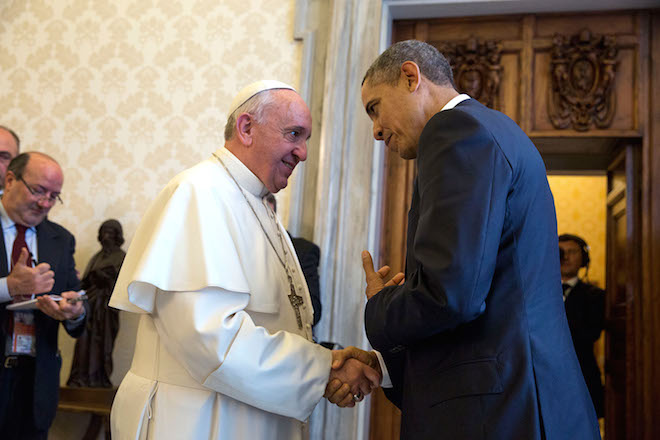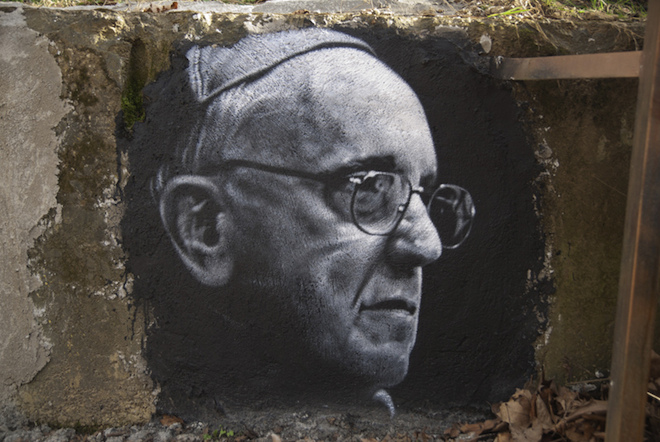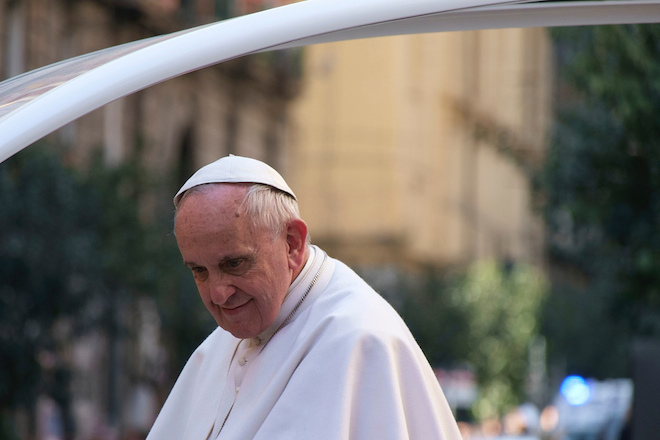
Pope Francis visited the U.S. for the first time last week, flying back to Rome on Sunday night after an eventful week of prayers, parades and politics. Some have described Francis, in contrast to popes of the past, as “liberal” or “progressive," pointing to his perspectives on hot-button political issues like gay marriage, abortion, climate change and the poor. Considering that college students are more likely to identify as liberal than conservative, and Americans have said they prefer Francis to popes of the past, it's likely that NU students are Francis fans, at least in party due to his perceived political leanings.
However, Tim Higgins, the campus minister at Northwestern’s Sheil Catholic Center, believes that Francis’s statements may have been misinterpreted.
“His statements and what he’s representing aren’t political at all in nature,” Higgins said. “He’s just stating the church doctrine of Catholic Social Teaching, which goes back to the late 1800s.”
Catholic Social Teaching is a doctrine focusing on the poor and emphasizing human dignity, which Higgins said Pope Francis has emphasized and may be part of why some say he is so controversial.
“If we look at the gospels, Jesus spent most of his time reaching out to those on the edges of society,” Higgins said. “Part of his ministry was to make people feel uncomfortable.”

In June, Pope Francis released a nearly 200-page encyclical outlining a moral imperative for action on climate change. A few days ago, in an address to the UN, he reiterated his belief in a right to environment and examined the disproportionate effect climate change can have on the poor.
Less than half of Americans that identify as conservatives report favorable opinions of the Pope, and Republican presidential candidates like Jeb Bush and Rick Santorum have both expressed disagreement with his position on the environment.
This idea, however, is not new: Higgins points to the book of Genesis, which emphasizes the idea of environmental stewardship and caring for creation. He also argued that it fell in line directly with the Pope’s focus on caring for the poor.
“Most environmental issues directly affect the poor, because nobody wants the power plant or oil drill or chemical factory in their backyard, so they end up in poorer areas where the people don’t have the power to fight back,” Higgins said.
SESP Junior Christina Cilento, the co-founder and editor of Northwestern environmental publication In Our Nature and Vice President of Sustainability for ASG, also touched on the concept of climate justice.
“Climate justice is the notion that climate change isn’t going to affect everyone equally, so poor people and people of color will be most severely affected,” Cilento said.
Natural disasters spurred by climate change disproportionately hit Asia and Africa, and developing countries in those regions are even less adept at mitigating or adapting to these changes. Reduction in crop yield, and subsequently higher food prices, also have a stronger effect on poorer communities.

The Pope has also distanced himself from more conservative perspectives on social issues, which some say align the church more with the modern day American Catholic. 82% of American Catholics say that birth control is morally acceptable, and 42% says the same about abortion. Official church teaching strongly condemns both, though Pope Francis has made candid remarks implying the benefits of family planning and allowed priests to forgive women who have had abortions.
Higgins, however, cautions against believing that the new tone is akin to ideological change.
“He’s made no doctrinal changes,” Higgins said. “I think he’s trying to expand people’s vision and perspective of what the integrity of all life is. Abortion is a life question, but there are so many other life issues - he’s not trying to get away from those, but trying to help us expand our understanding to encompass the integrity of all life.”
He compared the Pope’s philosophy to that of a parent - rather than automatically condemning a child who breaks the rules, a kind parent could sit the child down and discuss where they went wrong.
School of Communication junior Amanda Odasz, the communications chair of SHAPE, also cautioned against pundits who claim that Pope Francis is progressive on these issues. While happy about the shift in focus away from condemnations for those who have abortions or use contraception, she still saw opportunity for progress.
“The official perspective of the Church still is that abortion is a sin,” Odasz said. “I certainly don’t expect radical acceptance of abortion and reproductive rights within my lifetime, so at least he’s not at the forefront of the anti-abortion crusade, but I still wish it wasn’t stigmatized.”
The issue of contraception and abortion has a unique effect on the poor people Francis has chosen to focus on. Nearly half of women who have abortions have incomes below the federal poverty line, and their unintended pregnancy rates are five times as high. These unplanned pregnancies only force poor women to spiral deeper into poverty.
The Pope has also made provocative comments with regard to gay rights. Back in 2013, Pope Francis famously replied to a question about gay priests by asking, “Who am I to judge?” That controversial comment inspired applause from some gay rights groups, and many political pundits questioned whether change was in the air in Rome.
“This is in the Bible, the idea that no one should judge but God,” Higgins said. “Jesus, in the parable of the woman who’s going to be stoned because of adultery, told those who had not committed sin to throw the first stone. It’s not excusing people of wrongs, just taking a pastoral side to it. It’s not so dissimilar from the view of heterosexual acts of intercourse - you don’t partake in that before marriage, either.”
This pastoral perspective may be an improvement, but some LGBTQ activists say it does not go far enough. School of Communication sophomore Ross Cohen, a member of the executive board of Rainbow Alliance, said that denunciation of the action instead of the person is still denunciation.
“Condemning the actions of this person still says that a part of who they are is wrong,” Cohen said. “The perfect ideal would be to say that there’s noting wrong with homosexuality, but an intermediate step would be to say it’s wrong but those who practice it are not necessarily bad people.”